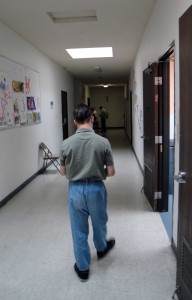Joseph Today
 WATB follows Joseph’s progress from his birth in 1985 through 1994, and then the epilogue hits most of the high points in his story for another decade. This page is offered as a response to readers who have asked for a more up-to-date perspective.
WATB follows Joseph’s progress from his birth in 1985 through 1994, and then the epilogue hits most of the high points in his story for another decade. This page is offered as a response to readers who have asked for a more up-to-date perspective.
I think what we have today is the resolution of two opposing game plans that were being pursued throughout his teenage years.
On one side, there were those of us who acknowledged that an outright cure for him was unlikely, but believed that it would still be wise to intervene in ways that could reduce the severity of his problems, always with the goal of empowering him to do more in life. Finding interventions was my obsession, and many seemed worth trying.
However, actual decisions about what Joseph would experience, on an hour-by-hour basis, were being made and implemented at his school, which had other priorities.
When he was little, his mom and I had rejected involvement by the school system. We thought the people who approached us about putting him in special preschool settings were officious, patronizing, and totally wrong-headed in their assumptions. Educators are scarcely mentioned in the story I’ve written, because we excluded them from the picture. But when he was seven years old, we could no longer maintain that independence. Judy had been diagnosed with cancer, I was scrambling to stay employed, and we were both emotionally exhausted. We needed help with Joseph, and we hoped that the right educators would see us as partners in the cause of building on the gains he’d achieved thus far.
We changed schools once, still hoping to find those partners, but never did. To cite just one of several ongoing disputes, I disagreed with their policy of using food items as a reward. I felt sure that a few words of praise meant more to Joseph, because praise made him smile! Giving him a cracker upon completion of a task was demeaning, not motivating. I redoubled my objections when I read on the Internet that many kids improved with a gluten-free diet. No one at the school had even heard of the diet, and they resented my meddling.
I could blame the school for its rigidity, but in all honesty, looking back now I wonder what potential either they or I had to affect Joseph by that stage in his life.
Their frustration with regard to motivating him was understandable, because fundamental questions remained unanswered: What was Joseph capable of doing, and what did he want to do? No one knew. An independent therapist spoke in terms of “attentional priority,” i.e., what he was paying attention to versus what everybody else wanted him to care about. She said we didn’t exactly have a motivation problem, because everyone is motivated to succeed, but that it’s also natural for people to turn away from challenges that don’t offer what they want. It felt like a circular argument.
 Upon completion of school, Joseph moved to an adult program, where he is today. When prompted, he’ll handle a chore like feeding paper to a shredder, but otherwise he tends to “self-isolate,” which means he puts himself a short distance from everybody else and just observes. He also paces around quite a lot. Despite being aloof, he’s apparently well-liked by his peers, who elected him Homecoming King last year.
Upon completion of school, Joseph moved to an adult program, where he is today. When prompted, he’ll handle a chore like feeding paper to a shredder, but otherwise he tends to “self-isolate,” which means he puts himself a short distance from everybody else and just observes. He also paces around quite a lot. Despite being aloof, he’s apparently well-liked by his peers, who elected him Homecoming King last year.
On the domestic side, he moved a few years ago to a licensed residential facility, where he has a roommate. The place was recommended to me by a friend, whose son also stays there. When people reach a certain age, he said, they need to move out and make their own future, according to their own lights. The arrangement has worked reasonably well. The place is clean and safe, and the staff is caring. I still talk about bringing Joseph back home to live with us, because I miss him. Maybe I will. Lidwina, his advocate from long ago, reminds me that he needs superb nutrition, physical exercise, and mental stimulation. I’d like to know for a fact that he’s getting all that.
But at some point, what the parent wants is not as important as it once was.